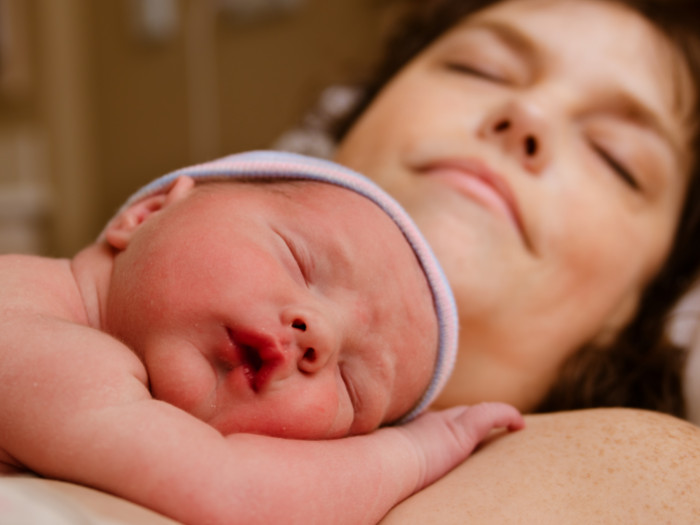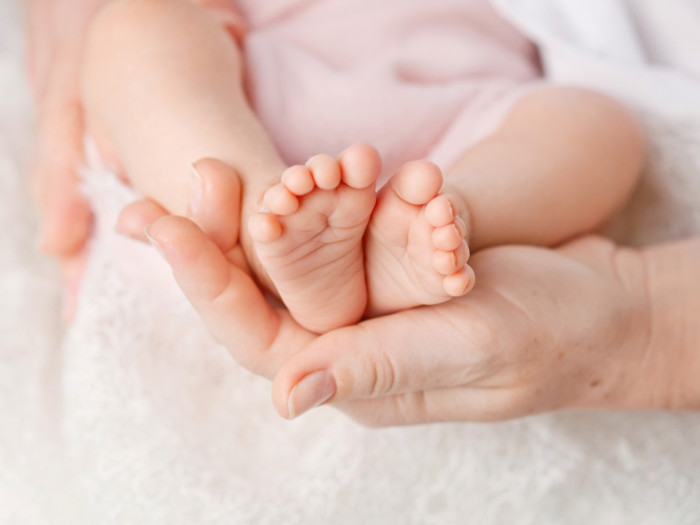Your baby finally arrived, and you are the happiest person on earth holding the newborn in your arms. You probably don’t even feel the discomfort, and exhaustion that often accompanies giving birth. Some of the symptoms you should expect after giving birth include after pains, sore breasts, constipation, vaginal discharge(lochia), hormonal fluctuations and weight gain.
Whether you are a first-time mother or not, you cannot avoid these changes. It is crucial for a new mother to take care of her health in a way that is both economical and child-friendly. There are many healthcare products as well as other techniques out there that promise to help you restore your health after the delivery.
Taking Care of Your Body After Birth
The top ways to take care of your body after birth include eating a healthy, balanced diet, follow a regular exercise routine, and get proper sleep and rest. Let us look at them in detail below:

A baby sleeping on the chest of a sleeping mother. Photo Credit: Shutterstock
Healthy & Balanced Diet
Giving birth can be a bit tough on your body; hence a new mother must take great care of her body after birth. Proper nutrition is essential in the postpartum stage which takes about six to eight weeks after delivery. A healthy, balanced diet aids in recovery and also gives you the energy and nutrients you need to take care of your baby. Healthcare providers advice new mothers to eat whenever they feel hungry, but unfortunately, many of them are often too tired or busy to eat. Choose foods from these five groups; vegetables(especially dark, leafy green ones), grains, dairy, fruits as well as proteins. Although you might be aiming to get rid of the gained pregnancy weight, strategies for rapid weight loss such as extreme dieting plans may be harmful to your health, and your baby’s thus should be avoided. To assist with constipation often experienced after delivery, mothers should eat fiber-rich foods, vegetables and drink fluids. [1]
Start with Gentle Exercises
Do you need to exercise during the first few weeks after delivery? Absolutely! It might be the very last thing you want to engage in, but it has numerous benefits. For instance, workouts can help improve your mood, lose some weight, relieve aches and pains as well as improve your energy levels and stamina. Nonetheless, even with all these benefits do not overdo it as it will be counteractive.
Start with gentle exercises such as pelvic floor exercises which aid in healing your vagina and perineum. Kegel exercises help you strengthen your pelvic muscles. Stay active by taking walks of about 20 minutes each day as soon as you can. For the first five months, avoid high-intensity exercises such as running or lifting. With regular exercise, new mothers become less at risk of getting Post Natal Depression(PND). [2]
However, if you delivered through cesarean section, don’t start exercising until your doctor gives you the go-ahead. Once you feel up to it take short walks to prevent the swelling and clotting of blood in your legs. You can join an exercise program for new mothers which can also act as a support group.
Get Rest When You Can
Babies have a different sleep schedule than adults. Most often a newborn sleeps for about three hours after which they wake and need feeding, changing as well as comfort. As a new mother, you might have some trouble adapting to this schedule and become exhausted. New mothers are prone to increased levels of fatigue during pregnancy and postpartum, according to a research report by Dr. Caryl L. Gay from the University of California, US. [3]Getting enough hours of sleep may not be happening anytime in the next few months. However, to regain your strength and restore your body after birth, you have to find a way to get some much-needed rest. Sleep whenever your baby is and introducing your baby to a bottle so that someone else can assist in feeding. Avoid being too tired as this makes it harder for you to handle your emotions thus leading you to postpartum depression or baby blues.
Take Care of Your Skin
With all the work involved in taking care of your newborn, probably the last thing on your mind is skin care. Hormonal fluctuations experienced after giving birth can bring about a lot of skin issues, including acne and discoloration. However, taking care of your skin is part of the healing process. Here are the most important steps for skincare post-delivery:
- Remove excess oil and prevent acne by washing your face regularly.
- Drinking water also aids in flushing out the toxins in your body and in stabilizing your hormones.
- Ensure you drink 8-10 glasses of water every day.
- Also, to get rid of stretch marks on your stomach and arms, use vitamin E oil, cocoa butter as well as olive oil which are child-friendly.
- Avoid any skin care product containing unfamiliar ingredients which may affect your baby.
- Apply sunscreen and cover yourself up when outdoors to eliminate pigmentation associated with pregnancy.
Ask For Help
The saying that ‘it takes a village’ is true when it comes to taking care of your baby after birth, especially in the first few weeks. There are days it will be easier, while others will take a toll on you. You might even lack time to take care of yourself, shower or even take a nap. Asking for help doesn’t indicate weakness, ask for it when you need it. Get a helper to watch your baby for a little while so that you aren’t overwhelmed with all the tasks that need doing. Babies consume a lot of time and energy, especially in the first few weeks after birth. Hence it wouldn’t hurt to have someone else take over some of the responsibilities at home. You can get help from friends, family or a home-care provider.

Hands holding a baby’s feet. Photo Credit: Shutterstock
Your body has just done one of the most remarkable things it will ever do by bringing another human into the world. Although you need to devote most of your time to your newborn, you also need to find time to restore your health and your body after birth. If you experience any health issues that are not normal after delivery, visit your doctor, or midwife to prevent any infections or complications. Your health is as important as your baby’s, and you should not take it for granted.
